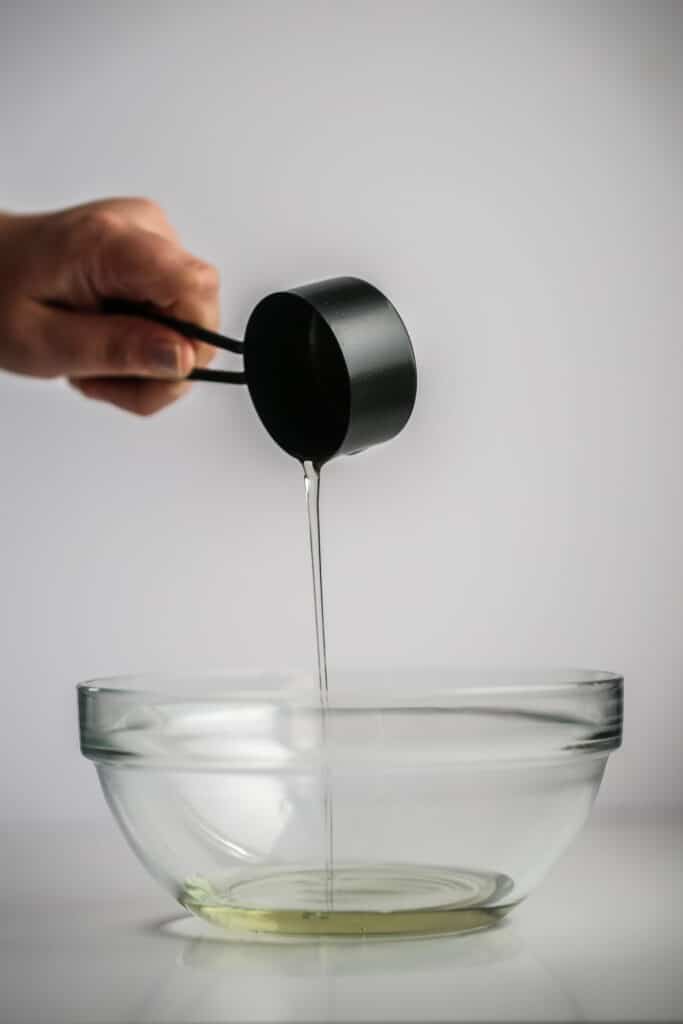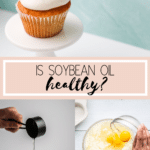Is Soybean Oil Healthy?
This post may contain affiliate links. Please read our disclosure policy.

This post has been sponsored by the United Soybean Board through Kitchen PLAY. All thoughts and opinions are my own. Thank you for supporting the brands that keep Kroll’s Korner running!
As a dietitian, I often get asked, “Is soybean oil healthy?” or “Is soybean oil bad for you?”
I thought I would take the time to break down the facts of soybean oil for you today and dispel any myths that may be floating around.
Soybean oil is the most widely used edible oil in the U.S. You probably use it most for salad dressing, homemade sauces or in your baked goods.
In fact, most of the bottled vegetable oil you are buying at the grocery store is actually 100% U.S.-Grown heart healthy soybean oil!
Soybean oil is versatile
Soybean oil’s neutral flavor makes it adaptable to nearly every fat or oil application in the food industry – which is pretty amazing!
It blends well with other fats and oils, making it a common ingredient in margarine, shortenings, dressing, baked goods and more.

The Benefits of Soybean Oil
- Soybean oil is an excellent source of ALA Omega-3s.
- Omega-3s affect cardiovascular health and may reduce blood pressure. The omega-6 fatty acids found naturally in soybean oil may reduce risk of heart disease and lower bad cholesterol when replacing saturated fats, according to the American Heart Association.
- The ALA found in soybean oil is the principal source of omega-3s in the U.S. diet, and omega-3 fats are recognized as the #1 most healthy fat.
- Plus, soybean oil is one of the few non-fish sources of omega-3 fatty acids.
- Soybean oil also contains a number of phytosterols, which have demonstrated the ability to reduce LDL cholesterol.
- Speaking of heart health, in 2017, the FDA authorized a qualified heart health claim confirming soybean oil’s ability to reduce the risk of coronary heart disease.
- The health claim states: “Supportive but not conclusive scientific evidence suggests that eating about 1 and 1/2 tablespoons (20.5 grams) daily of soybean oil, which contains unsaturated fat, may reduce the risk of coronary heart disease. To achieve this possible benefit, soybean oil is to replace saturated fat and not increase the total number of calories you eat in a day.”
- In addition, clinical studies have found that highly refined soybean oil does not cause allergic reactions in soy-allergic individuals.
- Soybean oil is also a source of Vitamin E.

High Oleic Soybean Oil
High oleic soybean oil is sourced from a new variety of soybean that has higher levels of oleic acid. This oil has an improved fat profile compared to conventional oil and offers functional benefits for the food industry.
High oleic soybean oil is currently being used in restaurant meals and packaged products, but it is not available as a bottled cooking oil at the grocery store.
In 2018, the FDA authorized a qualified heart health claim for oils high in oleic acid, including high oleic soybean oil, confirming their relationship to a reduced risk of coronary heart disease when replacing oils higher in saturated fats.
The claim states: “Supportive but not conclusive scientific evidence suggests that daily consumption of about 1 and 1⁄2 tablespoons (20 grams) of oils containing high levels of oleic acid, when replaced for fats and oils higher in saturated fat, may reduce the risk of coronary heart disease. To achieve this possible benefit, oleic acid-containing oils should not increase the total number of calories you eat in a day.”

Sustainably Grown & U.S. Grown
Soybeans are U.S. grown and certified sustainable, thereby contributing to a cleaner label and lower carbon footprint.
95% of U.S. soybean producers partner with the USDA to implement conservation practices on their farms.
U.S. soybean farmers employ sustainable practices, including crop rotation, reduced tillage and water management. These practices lead to a reduction in soil erosion, greenhouse gas emissions and energy use, as well as improved water use efficiency.
Almost half of the land in the U.S. is devoted to farming, and soybeans are the second largest crop, with 80 million acres planted.
There are more than 515,000 soybean farmers in the U.S.
100% of high oleic soybean oil is grown in the U.S.
73% of consumers believe in supporting domestic agriculture by buying foods produced with crops grown by U.S. farmers.

Myths about soy
Myth #1: Soy causes cancer. No. Soy does not cause cancer. It is a very beneficial and nutritious food. Soy actually may reduce the risk of some forms of cancer as well as heart disease risk. It’s a wonderful addition to everyone’s diet.
In human clinical trials there is no evidence to support that soy is detrimental in any way and, in fact, may be beneficial in some cases.
Research found that post-diagnosis soy intake was associated with reduced breast cancer recurrence and mortality in breast cancer patients. Data suggests soy intake reduces prostate cancer risk for men by as much as one-half.
The American Cancer Society and American Institute for Cancer Research say women with breast cancer can safely consume soy.
Myth #2: Soy and GMOs. The concern around GMOs that I hear is that they are unnatural and harmful. GMOs have been proven to be safe by many studies. There is no nutritional difference between foods grown with a GMO seed and non-GMO seed. The GMO technology is important to the industry and the farmers, and GMOs reduce chemical use.
People think GMO means adding something or putting something into the food. Not true.
Farmers use GMO seeds so they can have stronger, healthier plants. Farmers who use GMOs have plants that are more sustainable because they are using less pesticides, growing more crops per acre, and have a better environmental footprint.
Myth #3: Soy and menopause. Do you think you need to avoid soy during menopause?
No. Please enjoy soy in your diet. Research shows soy offers particular benefits to postmenopausal women.
Soy foods are a rich source of isoflavones, which is one type of phytoestrogen. Soy may alleviate hot flashes, night sweats, protect against osteoporosis and reduce risk of coronary heart disease. Soy may offer protection against future development of breast cancer if eaten before puberty.

How to cook with soybean oil
Soybean oil is versatile and can be used in a variety of recipes as substitutions for traditional ingredients.
Here are some ways to utilize it in your kitchen:
Soups and Salads: Sauté soybean oil with onions and garlic to enhance the flavor of soups or toss soybean oil with bread cubes and garlic to make homemade croutons.
Dressings and dips: Whisk soybean oil with raspberries and balsamic vinegar for an easy dressing or infuse soybean oil with herbs and garlic to create a bread dipping oil.
Appetizers: Fry soybean oil with thinly sliced root vegetables for crispy homemade chips or blend with garlic, lemon and cooked edamame for a twist on traditional hummus.
Entrees: Whisk soybean oil with fresh herbs for an easy marinade for meat or tofu. Also, try brushing on skewered vegetables before grilling to enhance flavor and texture.
Baked goods and desserts: Substitute soybean oil for solid fat in quick bread, cake and muffin recipes.
I hope this post helps you to understand soybean oil a little better. Please drop a question below if you have any!
Sources:
https://www.soyconnection.com/healthprofessionals/mythbusting
https://www.soyconnection.com/soy-for-the-food-industry/consumer-insights
https://www.qualisoy.com/food-industry-solutions/high-oleic-soybean-oil
https://www.qualisoy.com/benefits-of-u.s.-grown-ingredients
https://www.soyconnection.com/foodindustry/relabel-to-boost-oil-sales
https://www.soyconnection.com/soybean-oil-for-health

